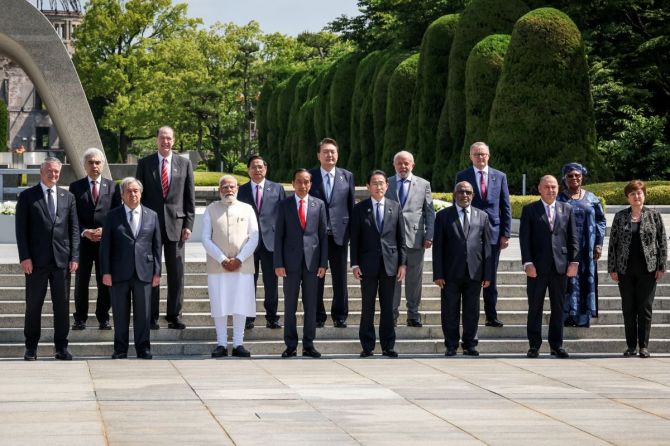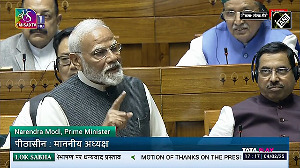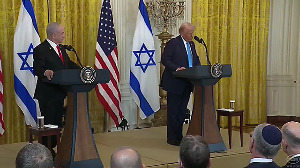Indian policymakers are almost alone, alongside the United States, in seeking a hard and multi-sectoral global decoupling from China in the expectation that it will boost their economies, observes Mihir S Sharma.

Central to the agenda of the summit of the Group of Seven (G7) countries, which has just concluded in the Japanese city of Hiroshima was the question of how to deal with China's growing economic power.
For the Japanese G7 presidency, economic security, economic coercion, and economic resilience were the questions that the G7 should address.
And that is a crucial reason why Prime Minister Kishida Fumio ensured that not just India, but also Brazil, Indonesia, Vietnam, and South Korea had a place at the G7 table.
These countries will be crucial in determining the success of any effort to ensure China's economic rise does not imply geo-economic dominance and geopolitical bullying.
The eventual communique from the G7 summit noted that the grouping agreed on 'co-operation' to 'support a more significant role for low and middle-income countries in supply chains' and that it would 'address non-market policies and practices designed to reinforce dependencies, and will counter economic coercion'.
Yet, in effect, the summit may have underlined the deep divisions on how best to manage a Beijing that does not hesitate to use its economic heft in the service of its national security priorities.
The debate over 'decoupling' from the Chinese economy illustrates this division quite effectively.
The Anglo-American press reacted with exaggerated horror when, just over a month ago, French President Emmanuel Macron travelled to Beijing and mentioned during that trip that he had little time for economic 'decoupling'.
This was not something Mr Macron came up on the fly, however. It reflected, quite accurately, the systematised European view on the problem.
They came around, a few years ago, to worrying about dependence on China -- but they also recognise that the globalised European economy benefits more than most from trade ties.
Their effort, therefore, is to try and identify the specific areas where they need to insulate their economies from possible coercion or dependence, while insulating broader trade ties from a downturn in EU-China relations.
It turns out that the Japanese and Koreans have a similar approach.
As neighbours of China, they are far more careful about their rhetoric than the Europeans, Australians, or Americans.
But they are certainly concerned about their own economic security -- after all, it was Japanese companies which were the first targets of Beijing's economic coercion more than a decade ago, when Chinese rare earths exports to Japan were curtailed following a standoff at the disputed Senkaku Islands off Taiwan.
Japanese companies are eager to de-risk their own supply chains and reduce their exposure to China.
But they have also come to realise that this should happen on their own terms, and de-risking does not mean a complete decoupling.
Or, even more interestingly, they see their businesses as 'already decoupled' and do not intend to do anything further.
Indeed, in a recent survey by the Japan Bank of International Co-operation, a large number of Japanese manufacturing companies indicated that they had already isolated their 'US' and 'China' supply chains.
Such concerns about decoupling emerge also from worries in Europe, Japan and Korea about how it is being implemented by the United States in particular.
Europe sees decoupling being used as an excuse in the US for inward-looking controls, subsidies and protectionism.
North-east Asia thinks that their powerful conglomerates are being disadvantaged in the implementation of decoupling as compared to US-based companies.
Thus the desire to squeeze China-centric supply chains is increasingly being limited purely to those which might have a material effect on economic or national security.
Some of these doubts are reflected in the G7 statement, which insisted that any controls would be limited to 'a clearly defined, narrow set of sensitive technologies that are crucial for national security or could threaten international peace and security' and that the 'broader trade in technology' would not be impacted.
What are the implications of this shift towards a milder version of economic containment of China on the observers at Hiroshima -- particularly Vietnam, Brazil, Indonesia and India? For the two ASEAN countries there, integration with China is a clear path to prosperity.
It is hard to find a country with a harder line on Chinese interference than Vietnam -- but, equally, that fast-growing economy has benefited sharply from building supply chains that pass through China.
Over half of the value of Vietnamese exports now comes from embedded foreign value-added, and China is the largest single contributor to that (according to OECD data).
Then there's Brazil. China is its largest market, absorbing over a quarter of its exports; and 96 per cent of these exports are commodity-based in one way or another.
For these two countries, as with Indonesia, there are legitimate fears of dependence -- but no alternative to continuing maintaining an economic partnership.
Early hopes that 'decoupling' would lead to a surge in investment avoiding China and going to other middle-income countries are now seen as unrealistic.
Indeed, while most Japanese companies in India and Vietnam have said in surveys that they will expand their local operations, that percentage still does not reach pre-pandemic levels.
The longer-term implications are even more uncertain.
The April 2023 World Economic Outlook from the International Monetary Fund has modelled the effect on 'nonaligned' emerging economies, especially India and Indonesia, of fragmentation and decoupling.
And, it turns out, in a world ruled by fragmentation and political uncertainty, these countries will in fact see a significant reduction in capital inflows and growth.
Indian policymakers are therefore almost alone, alongside the United States, in seeking a hard and multi-sectoral global decoupling from China in the expectation that it will boost their economies.
It is possible that we will look back on the years between 2020 and 2022 as the high point of decoupling energy.
We in India benefited from the growth of that narrative.
But the question we should now be asking ourselves is whether we locked in the benefits of that period as much as we could have and should have.
And, furthermore, if the world shifts to more targeted measures to reduce dependence, end coercion, and increase resilience, how our policies for investment and trade will need to adapt.
Mihir S Sharma is head of the Economy and Growth Programme at the Observer Research Foundation, New Delhi.












 © 2025
© 2025